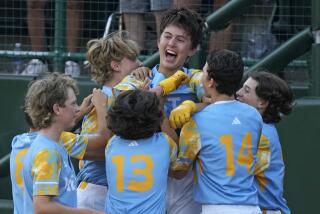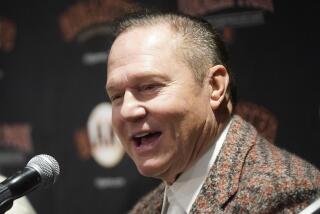Movie Review : And a Little Child Shall Manage Them : ‘Little Big League’ is an adult’s baseball fantasy retooled for tykes.
- Share via
In “Little Big League,” 12-year-old baseball maven Billy Heywood (Luke Edwards) inherits the general managership of the Minnesota Twins from his grandfather (Jason Robards) and ends up becoming the team’s manager too. It’s yet another Hollywood high concept in the burgeoning baseball movie cottage industry. But think about it--is it really every boy’s fantasy to manage a ball club?
What seems more likely is that “Little Big League” is an adult’s baseball fantasy retooled for tykes. After all, a boy would more likely fantasize himself a slugger who wins the game for his team with a bases-loaded home run; the adult fantasy is to be that team’s CEO. “Little Big League” tries to reconcile two conflicting scenarios: It gives us baseball as a game for the child within all of us but then it makes that child a corporate honcho. It’s the perfect split for the ‘90s.
Billy, of course, isn’t much of a player on the field--we can identify better with him that way. But this Little Big Man knows every bit of baseball lore since the days of Abner Doubleday and he’s a master tactician, too; he even knows how to psych out the troublemakers on his team and cajole their prowess. He brings the Twins from the cellar to pennant contention and he does it by making baseball fun again. That’s his philosophy--forget winning or losing, forget the money, just have fun. Of course, the filmmakers have it both ways on this, too: All this baseball-as-fun stuff points toward fame and fortune.
*
Director Andrew Scheinman and screenwriters Gregory Pincus and Adam Scheinman don’t really delve into what it might be like for a 12-year-old to own and manage a baseball team; they don’t really get into the ways in which the sport has been corporatized and how that would affect what a manager can do. Some of the players are surly, and one--Billy’s childhood idol--has to be let go, but you won’t be seeing any Darryl Strawberrys on this club. “Little Big League” isn’t really in a position to jab the corporate sports culture because a movie with this hard a sell implicitly endorses that culture. It’s Hollywood hardball masquerading as whiffle ball.
Billy would have been more interesting if he demonstrated some surly sides of his own, but he’s drearily saintly and precocious. This fatherless boy has a weak spell when one of the players (Timothy Busfield) woos his mom (Ashley Crowe) and finds himself inexplicably benched. But that’s about as petty as Billy gets--oh yes, he also forgets to go fishing with his buddies (Billy L. Sullivan and Miles Feulner) when he gets a lunch offer from Reggie Jackson. Excuuuuse me.
*
Billy picks up a few life lessons along the way--not much mention is made of the school lessons he’ll have to make up--but most of the wisdom emanates from the boy. And if he seems wise beyond his years, that’s because baseball here is employed as a metaphor for life. He who masters the game masters life. The field of dreams is soggy with sentiment.
First-time director Andrew Scheinman--one of the partners in Castle Rock Entertainment--may have too much of the Billy in himself to bring out the true roisterousness of baseball. He manages the movie with too soft a touch. The film’s injected pathos isn’t true to what most adults respond to in the sport--let alone children. It’s a movie about “growing up”--i.e., becoming responsible. But the best, the least pretentious baseball movies have always been about how the game can make you blessedly irresponsible.
* MPAA rating: PG, for some mild language and sensuality. Times guidelines: It includes some roughhousing on the baseball field and a funeral scene.
‘Little Big League’
Luke Edwards: Billy Heywood
Timothy Busfield: Lou Collins
Ashley Crowe: Jenny Heywood
Jonathan Silverman: Jim Bowers
A Castle Rock Entertainment presentation. Director Andrew Scheinman. Producer Mike Lobell. Executive producers Steve Nicolaides, Andrew Bergman. Screenplay Gregory K. Pincus, Adam Scheinman. Cinematographer Donald Thorin. Editor Michael Jablow. Costumes Erica Edell Phillips. Music Stanley Clarke. Production design Jeffrey Howard. Set decorator Ethel Robins Richards. Running time: 1 hour, 51 minutes.
* In general release throughout Southern California.
More to Read
Go beyond the scoreboard
Get the latest on L.A.'s teams in the daily Sports Report newsletter.
You may occasionally receive promotional content from the Los Angeles Times.










